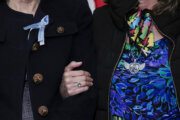This article was republished with permission from WTOP’s news partners at Maryland Matters. Sign up for Maryland Matters’ free email subscription today.
This content was republished with permission from WTOP’s news partners at Maryland Matters. Sign up for Maryland Matters’ free email subscription today.
With early voting in Maryland set to begin in less than two weeks, Attorney General Brian E. Frosh (D) issued a harsh warning against voter intimidation on Wednesday.
Voter intimidation is both a state and federal crime, Frosh said in a release, warning that attempting to influence a voter’s decisions based on threats, intimidation or bribery can lead to up to five years in prison and a $5,000 fine. He said he plans to crack down on any attempted voter suppression during the upcoming election.
“Maryland and federal law provides every voter the right to vote free of coercion or intimidation,” Frosh said. “Voter harassment and intimidation is illegal and will not be tolerated in Maryland. Anyone attempting to violate these laws will be held accountable and prosecuted.”
According to Frosh, some examples of intimidation include:
- Spreading misinformation about voting and voter fraud;
- Violence inside or outside of a polling place;
- Confronting voters while wearing “military-style” or “official-looking” uniforms;
- Brandishing firearms or using guns in an “intimidating display;”
- Following voters to, from or within a polling place;
- Invading voters’ personal space in a way that violates “COVID-related social distancing;”
- Threats of violence;
- Writing down voters’ license plates;
- “Aggressively” questioning voters’ qualifications to vote; and
- Gathering a private militia at a polling place.
Frosh’s warning against voter intimidation comes after President Trump stoked fears over voter intimidation during the first presidential debate last month. During the debate, Trump said he wants his supporters to head to the polls and watch “very carefully” for the Nov. 3 election.
“I am urging my supporters to go into the polls and watch very carefully, because that’s what has to happen,” Trump said during the first presidential debate in late September. “I am urging them to do it.”
Trump’s comments worried some local government officials in Maryland: Montgomery County Deputy Election Director Alysoun McLaughlin said earlier this month that local police are adjusting their patrols to include ballot drop-off boxes as the election approaches.
But Frosh noted that Maryland’s election law allows certain groups or individuals to designate registered voters as challengers or watchers for in-person voting. Those poll watchers are limited in their roles and likewise banned from voter intimidation, Frosh wrote, and can’t prevent someone voting.
According to the Maryland State Board of Elections, “Any individual can enter a polling place to challenge the right of any other individual to vote. To remain in a polling place and observe the voting process, you must be a registered voter in Maryland and be designated as a challenger and watcher.”
The State Board of Elections, local boards of elections, candidates, recognized political parties and “any other group of voters supporting or opposing a candidate, principle, or proposition on the ballot,” can designate a poll watcher, according to the State Board of Elections. A group of voters must form a political committee under the state’s election law in order to designate a poll watcher.
Poll watchers can “challenge the right of any person to vote only on the grounds of identity,” Frosh wrote, although a person whose identity is challenged can still vote by provisional ballot. Watchers can observe ballots being cast, but can’t ascertain how a voter voted or intends to vote, talk with voters in the polling place, help voters cast their ballots or physically handle original election documents.
According to the State Board of Elections, mail-in ballot and provisional canvasses are open to the public. Due to the coronavirus pandemic, however, local boards of elections are handling observation somewhat differently than in a normal election year. Voters can contact their local board of elections for more information on how to observe the canvass.
Voters should report intimidation to the Office of Attorney General at 443-961-2830 or toll free at 833-282-0960, or by email at electionswork@oag.state.md.us.







